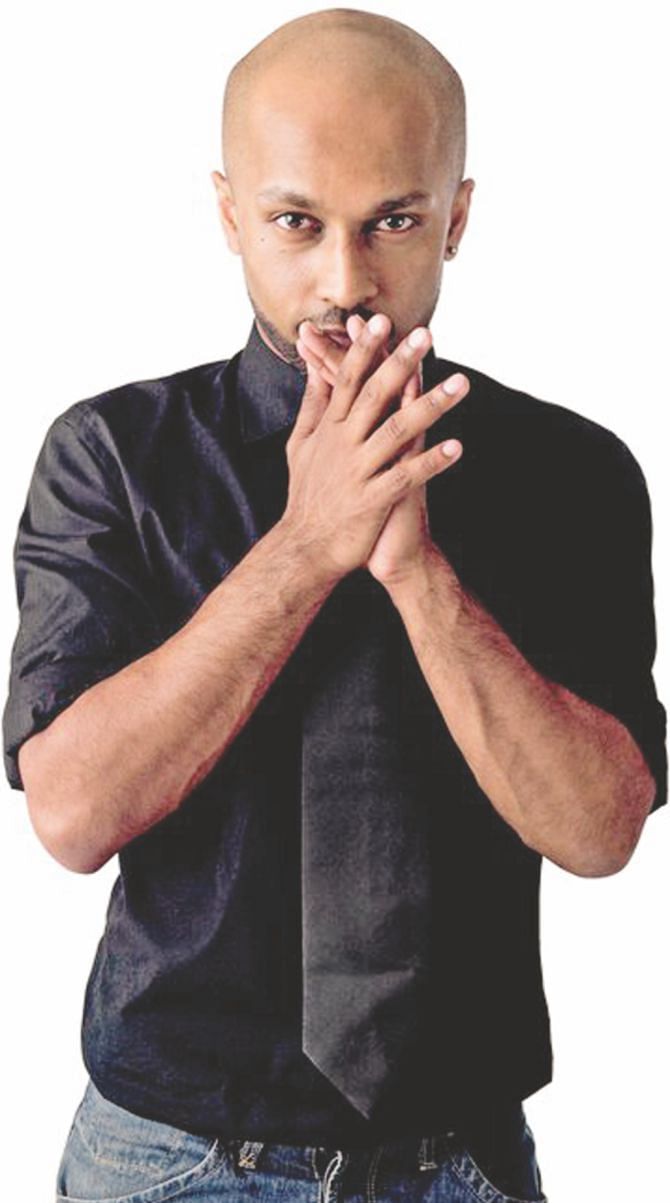I DON'T REALLY WANT TO BE REMEMBERED… Akram Khan
I DON'T REALLY WANT TO BE REMEMBERED… Akram Khan

Akram Khan -- born in London (England) to Bangladeshi parents, was touring the world at the age of 13, with legendary theatre and film director Peter Brook's production of Mahabharata. Combining his Kathak training and contemporary styles, he became a name to be reckoned with in the world of performing arts. Akram has collaborated with artistes ranging from Pandit Birju Maharaj to Kylie Minogue, and has performed on a stage as big as the London Olympics opening ceremony. He is visiting Dhaka to perform his production DESH – a production about his connection with Bangladesh, and The Daily Star caught up with the prolific choreographer-performer for a one-to-one conversation.
What is the energy that drives you as an artiste?
Akram: The fear of failing is one thing that really drives me. From an early age, I was sort of groomed to believe that I would be a failure, because I was not very academic. So I am always trying hard to succeed. As for the energy, I think it is curiosity. Like my daughter, who is just a baby, will become an adult one day, and she will lose something brilliant that she has; the idea of infinite possibilities. (Picks up a business card from the table) The point where she picks this up, she doesn't know what it is but she is completely fascinated by it; we just accept it's a card. That curiosity and fascination drives me. I think it drives all artistes to some extent.
Is there any subject or emotion that you like to express more than others through your work?
Akram: It depends on the work. In DESH, there's a lot of anger, and a lot of humour. But in other works, there's a lot of sadness, melancholy, and a lot of joy. So it varies depending on the subject.
How do you want to be remembered as?
Akram: I don't really want to be remembered, really. I think it's important that people see me perform and then forget me. Because if they remember me, it becomes static; and we're constantly transforming. There was a Hindu priest who gave up his name. A journalist asked him why, to which he said “I once had a name, and people remembered me by it; they remembered me in a very specific way. But I am a different person today than I might be tomorrow.” I don't mind if people forget me; I just hope my daughter doesn't. Also, I think it's important to not hold on. I am doing things my way, the next generation will do it in a way more relevant to their times. If they hold on to me, they won't be able to discover that.
When you started working, what kind of negative forces did you have to face?
Akram: There was a lot of negativity regarding dance, or music, generally. It's regarded more of a hobby and not a profession. Everybody in the Bangladeshi community there (in UK) asked me what I did, and my answer “I dance” was not accepted well. Also, religion came into play. When I worked with Peter Brook as a young boy, in the Mahabharata, people came up to my mother and asked her to stop me from doing a Hindu play. There was a lot of resistance, but my mother didn't back down, because she believed art transcends religion. To her, Mahabharata was just a fantasy, a story. Islam is a religion to us, to others it's just a story.
Tell us a little about your training regime.
Akram: I prepare, to prepare, to prepare. In 2012, I injured myself badly to the point my career was assumed over. But then I met a specialist surgeon, who attached my Achilles tendon, and over six months, I recovered. So now I do a lot of preparation to avoid injury, because the dance I do, physically it's meant for 20 or 30-year olds. At my age of 40, it's a big risk. Then I do my training, which is Kathak, and then I do my own work, which is experimentation.
What work are you doing next?
Akram: I'm doing a work on the Mahabharata, again, focusing on a female character. I think they're predominantly quiet, and the male characters are more celebrated. So my work is focused on Amba (who was later born as Shikhandi), and we're doing it only in round spaces. We're also in the process of making a feature film with Danny Boyle (“Slumdog Millionaire”, “Trainspotting”), and hopefully, schedule permitting, we're hoping to rope in Joe Wright (“Pride and Prejudice”) to make a feature film on DESH.